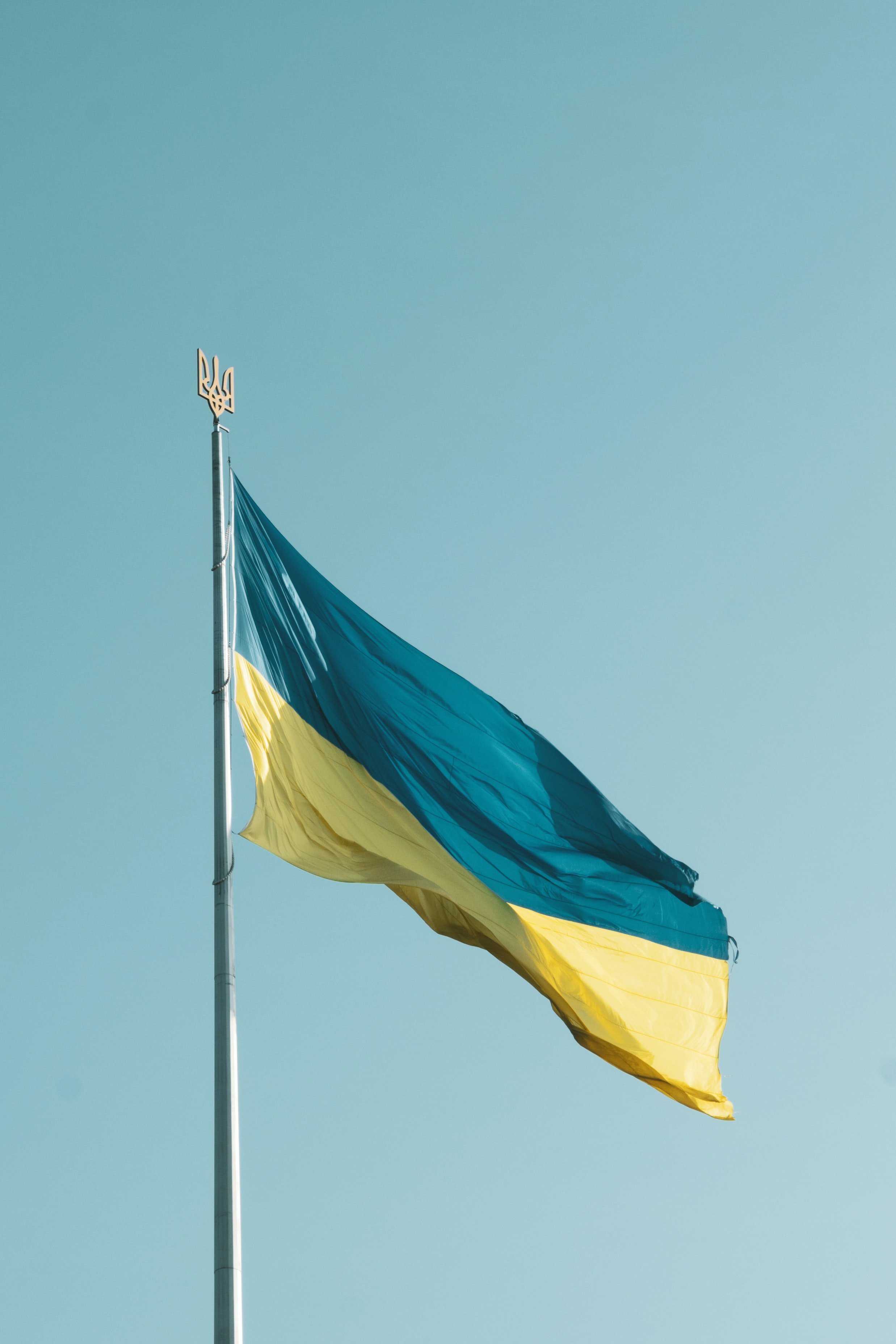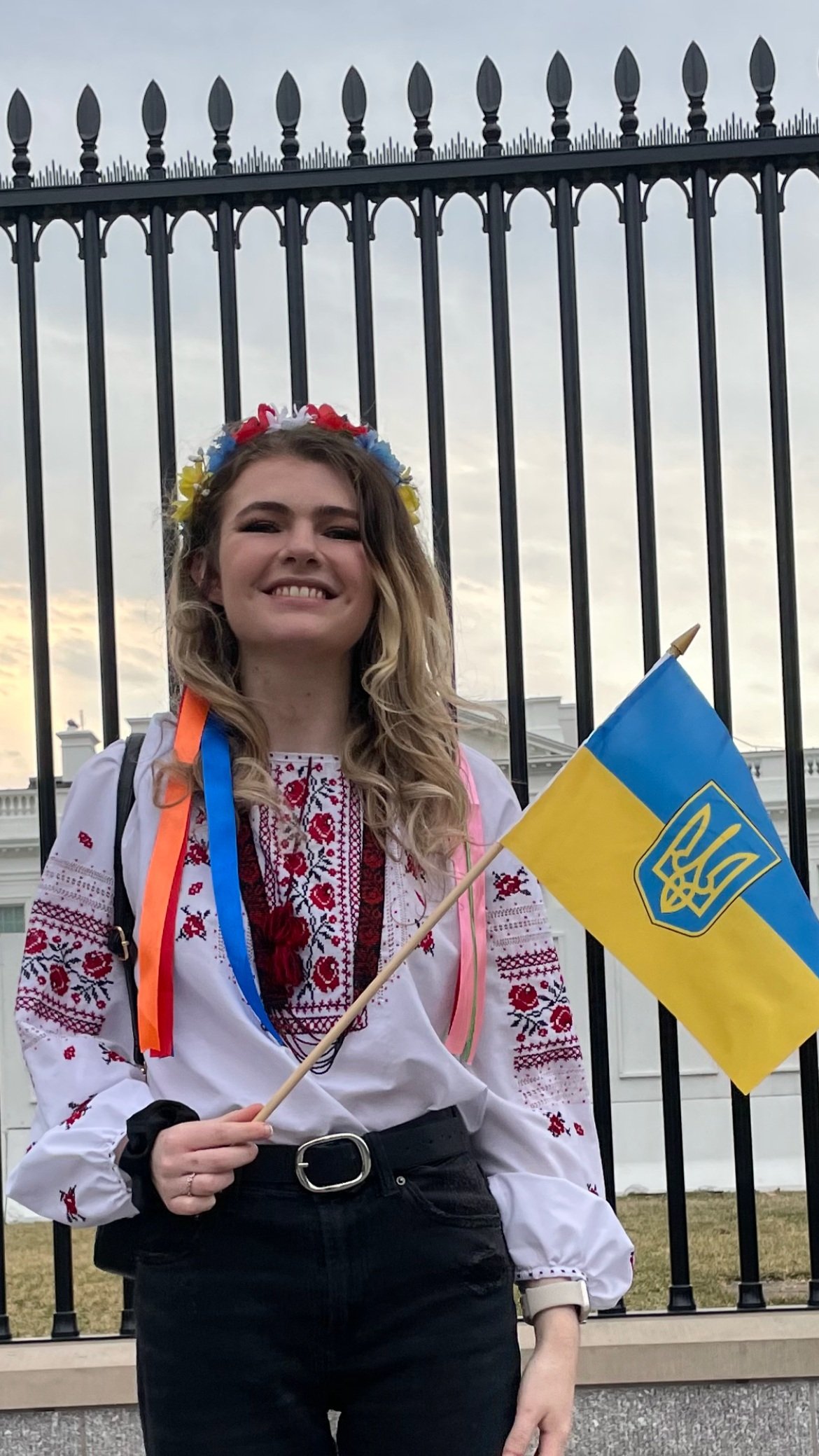Photo by Sylwia Bartyzel on Unsplash
On the news a woman holds a dustpan in her trembling hands as she carefully sweeps up a pile of broken shards of glass — all that remains of what once were windows in the home she shares with her mother in Kyiv. Over her shoulder, the viewer can see the smoking remains of what used to be a neighborhood, flattened and reduced to piles of rubble and smoldering artillery. As she tearfully brushes the glass off her counter, she is singing the national anthem of Ukraine, her warbled voice barely rising over the tinkling of glass hitting the inside of her dust-coated trash can. “Ukraine’s freedom has not yet perished, nor has her glory,” she chokes out, almost desperately, “Upon us, fellow Ukrainians, fate shall smile once more.”
Across the world, a brutal war unlike anything we have witnessed in our lifetime rages on in Ukraine. Hospitals and residential buildings are bombed indiscriminately, families with small children and pets cower fearfully in makeshift bomb shelters, transportation designated for refugees fleeing violence are fired upon before they even make it beyond city limits. Estimated casualties range in the thousands, with hundreds of those deaths being civilians, and the horrific truth is that the numbers will be even higher by the time this blog is posted. We are, nearly in real-time, watching unspeakable crimes against humanity play out across our screens.
“Being a second-generation Ukrainian-American has always been a fundamental and important part of my identity, a piece of my history that I revere and celebrate.”
Photo by Tina Hartung on Unsplash
I have never lived in a world without a free and independent Ukraine — I was born after 1991, the year Ukraine declared its independence — and I certainly never imagined a world where that independence may be in jeopardy. Many years ago, my grandparents fled from the violence in Soviet-occupied Ukraine and arrived at Ellis Island with nothing but a single crate of belongings, a few basic English phrases, and a desperation for safety and freedom.
Forced to leave behind everything they had ever known, they found refuge and connection in the local Ukrainian community. Slowly, amidst the grief, loss, and anguish, they picked up the pieces of their former lives and began anew. They raised their children, my father and uncle, to not just be aware of their Ukrainian culture and heritage, but to take pride in it. They taught them the language, educated them on holidays and traditions, and ensured that the spirit of their nation carried on in a world that was attempting to eradicate it.
I do not have words to describe the guttural pain I feel watching Ukrainians frantically packing up what pieces of their lives they can carry with them and run away from danger, away from the land they love. I thought no Ukrainian would ever have to fear, let alone suffer, the atrocities my grandparents faced ever again. I have never been more devastated to be wrong.
But one does not need to be Ukrainian for the images of this war to invoke an overwhelming sense of dismay and helplessness, the type of grief that carves away at your insides and leaves you feeling hollow and and hopeless. There is a vicarious anguish we as human beings experience when witnessing the suffering of another person, an empathy so visceral that their pain becomes our shared pain. The tears of those suffering on our screens blur our vision as they become our own tears.
These emotions, thoughts, and fears can feel overwhelming and heavy in a way that feels suffocating, and while that may feel frightening, I want to make something clear — all of these reactions are normal and reasonable reactions to witnessing the horrors of war, even from afar. To feel broken down and weary right now is to experience the essence of what makes us human; compassion and love for our fellow human beings, even those whose languages we do not speak or whose cultures we do not understand.
What happens, then, when that heaviness and vicarious pain feel like too much to bear? What can we do to abate this feeling of helplessness?
Photo by Elena Mozhvilo on Unsplash
How can we reach out from across the world in a way that provides comfort, aid, and humanity to those suffering?
For those with the monetary means, there are many reputable organizations providing aid to Ukrainians, both residents and refugees:
The National Bank of Ukraine has opened a fundraising account specifically dedicated to providing humanitarian assistance to Ukrainians impacted by Russia's invasion.
World Central Kitchen has set up food distribution sites in Ukraine as well as on the borders of neighboring countries, providing hot meals to refugees as they make their way to safety.
Fight for Right is working to safely evacuate and provide financial assistance to Ukrainians with disabilities.
Sunflower of Peace works to deliver and distribute medical supplies to those in Ukraine.
On a more local level, St. Andrew Ukrainian Orthodox Cathedral in Silver Spring, Maryland is collecting donations and facilitating their shipment and distribution in Ukraine.
For those who are unable to donate, actions such as contacting government officials, attending rallies to support Ukraine, signing petitions, and using social media to raise awareness are all methods in which you as an individual can provide support.
But what about after that? What are the solutions for how to cope, how to make sense of these atrocities, how to simply deal while elsewhere the world burns? As a therapist, this is the part where I want to be able to provide resources, skills, tools to make this a little less awful, to help make that empty ache in your chest and the lump in your throat go away. Believe me when I say that I have searched desperately for something, anything, to help find meaning and make sense of this atrocity.
“The unfortunate reality is that there are no coping skills, or breathing techniques, or grounding exercises that can fully alleviate the raw dismay and devastation that accompany witnessing the inhumanity of war.”
This, I am learning in real time, is one of the heaviest costs of being human. To experience empathy for our fellow person is to ache for them in an incurable way during moments of catastrophic hardship.
What we can do, however, is not allow the weight of these emotions to trap us in the throes of helplessness. The desperation in us to relieve these difficult feelings, combined with the constant stream of war-related content readily available on social media and television, can lead us to doom-scrolling through the news for hours on end.
While it is critically important that we continue to bear witness and remain informed, over-consumption of heartbreaking media in the name of doing something can wear on us to the point where we feel crippled and broken in a way that prevents us from doing anything at all. We cannot help Ukraine if we allow ourselves to become paralyzed by images of suffering. Ukrainians do not have the privilege of stepping away from the news of war, because our nightly news broadcast is their reality. They do not have the ability to give themselves time to reset and process, but we do.
I ask you to make an effort to replace the guilt that may arise from taking a break from active consumption of coverage with appreciation and gratitude for the things we have witnessed Ukrainians have torn away from them. Take time to appreciate and benefit from the comforts of family, safety, security, and freedom; these liberties are what allow us to recharge our capacity for empathy, to continue forward with hope, empathy, and a rallying cry for humanity.
Photo by Yohan Marion on Unsplash
In the moments where I personally feel my knees buckling under the weight of the atrocities of the world, two images come to mind. I think first of my grandparents. I remember their dogged resilience in the face of war, their unwavering hope, and their refusal to let the spirit or glory of Ukraine die. Then, I think of Katya Gulenko, standing in the decimated shell of her home, singing quietly and defiantly of freedom. Surrounded by both the literal and metaphorical shattered fragments of her former life, she slowly picked up the pieces and, in the face of unspeakable tragedy, continued on. So must we.
Kat Filipov, LGPC (she/her), is a therapist at Space Between Counseling services. She is currently accepting new clients on Tuesdays and Wednesdays. Kat believes that therapy is not "one size fits all", and draws from a myriad of techniques and theories to help tailor her work to each client's specific needs.
She works with individuals and couples located in the state of Maryland as they navigate substance abuse/recovery, anxiety, healthy communication, LGBTQIA+ related issues, life transitions, and more.
To learn more about working with Kat, follow the link below:







